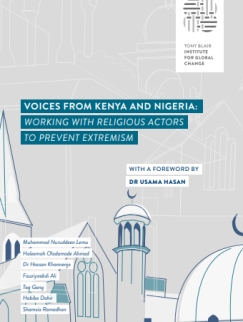This essay is situated within a larger collection of essays published by the Tony Blair Institute for Global Change in partnership with the Institue and the Alliance for Peacebuilding through the support of the GHR Foundation. The collection of essays explore challenges and opportunities for policymakers working with religious actors involved in counter-terrorism and preventing/countering violent extremism (CT/PCVE), following an Insight Forum in Nairobi, Republic of Kenya in 2019.
In this essay, author Habiba Dahir argues that engaging women on religion-based platforms is important in CT/PCVE, especially because terrorists employ a gendered construction of ideologies to justify violence. In this regard, the essay explores how Muslim women’s associations, teachers, civil society leaders, psychologists, and female religious scholars have been instrumental in CT/PCVE efforts across north-eastern Nigeria, including in the disarmament, demobilization, and reintegration (DDR) of persons formerly associated with Boko Haram. More specifically, the study details how women have been increasingly engaged by the government in interfaith dialogue, counter-narratives, and reintegration efforts in direct response to Boko Haram’s instrumentalisation of women. The essay concludes by offering recommendations to recognize the diversity of experiences and needs of persons formerly associated with Boko Haram, with policies and programmes tailored to their specific context, needs and experiences. For example, the study suggests that women offer a meaningful counter-narrative within their local communities and play a crucial gatekeeping role in determining the acceptance of former associates of Boko Haram.
